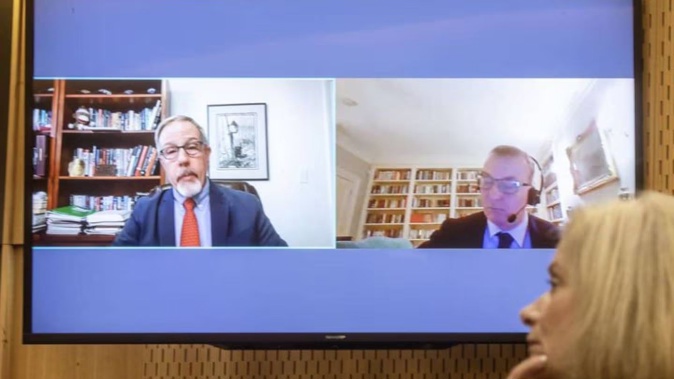
By Danielle Clent of RNZ
All frontline police officers should be trained to enter a scene with an active armed offender, an American expert in counter-terrorism has told the mosque attack inquest.
Dr Frank Straub began his law enforcement career in the 1980s and was involved in rescue operations in the 9/11 twin towers terrorist attack.
He is now the senior director of violence protection for a non-profit organisation.
Dr Straub, alongside Scottish counter-terrorism expert Scott Wilson, co-authored a report about the Christchurch terror attack of March 15, 2019.
Both experts gave evidence via an audio-visual link during the inquest into the deaths of 51 worshippers at Al Noor Mosque and Linwood Islamic Centre.
Straub told the Coroner’s Court it was not possible to ever be truly desensitised to situations like the mosque shootings but training first responders in “as realistic as possible scenarios” could help them flip a switch in their brain and deal with it.
He said the United States “had to learn the hard way” how best to deal with mass casualty incidents.
/cloudfront-ap-southeast-2.images.arcpublishing.com/nzme/DFLA2TC5TYBFMSMUQKFLWTITCI.jpg)
Police officers stand outside the Al Noor Mosque in Christchurch. Photo / Mark Mitchell
School shootings, such as the tragedy at Columbine High School in 1999, had helped law enforcement improve protocols over time, Straub said.
- Emergency response like trying to put together 1000-piece jigsaw puzzle, terror inquest finds
- Mosque attack incident controller unaware of St John's safety concerns
- Terror attack inquest: Paramedics pulled over for 6 minutes en route to second mosque
- 'They needed a hospital': Paramedic breaks down talking about terror attack survivors
Nowadays, the first officer on any scene has the training required to go to the sound of gunfire and “neutralise” the assailant or assailants.
“It is our theory that we can’t lose time, the shooter is on location, the shooter has time on their side and tactical advantage and it’s incumbent upon us to stop that as soon as humanly possible, even if it means that we don’t get to go home to our families.”
Wilson said most police in the United Kingdom were not generally armed - but those that were had extensive training and were usually very quick to respond to serious situations.
He said officers first on scene could not “sit and do nothing”. It would not be a good public perception if shots were still being heard on scene and police were not trying to stop them.
Straub said he could not agree with New Zealand Police protocol that it was not recommended a single officer enter a scene with an active shooter due to the extreme risk involved.
/cloudfront-ap-southeast-2.images.arcpublishing.com/nzme/7BOEJAREQ77GUHMTUGTTEPSFK4.jpg)
Al Noor mosque in Christchurch. Photo / George Heard
He did not believe an unarmed officer should go into a scene - but said all needed to be trained and equipped to engage as a solo officer if necessary.
Regarding the Christchurch attack, if police arrived on the scene and the terrorist was still there, they should have been able to move forward straight away, Straub said.
“I believe it’s law enforcement’s responsibility and we take an oath to protect the lives of others. In this case, innocent individuals were being slaughtered by an individual with a high-powered rifle.
“I believe that it was law enforcement’s responsibility, in that they were armed, to attempt to neutralise or contain the individual should he have been there at the time.”
Straub said all first responders who attended the mosque scenes were brave and courageous, acting in a way consistent with their training.
But he said learnings could come from this to strengthen any future response and “hopefully change outcomes in the future”.
Inquest will examine these 10 issues over six weeks:
· Events of March 15, 2019 from the commencement of the attack until the terrorist’s formal interview by police
· Response times and entry processes of police and ambulance officers at each mosque
· Triage and medical response at each mosque
· The steps that were taken to apprehend the offender
· The role of, and processes undertaken by, Christchurch Hospital in responding to the attack
· Co-ordination between emergency services and first responders
· Whether the terrorist had any direct assistance from any other person on March 15, 2019
· If raised by immediate family, and to the extent it can be ascertained, the final movements and time of death for each of the deceased
· The cause of death for each of the victims and whether any deaths could have been avoided
· Whether Al Noor Mosque’s emergency exit door in the southeast corner of the main prayer room failed to function during the attack and, if so, why?
The inquest continues.
- RNZ
Take your Radio, Podcasts and Music with you









